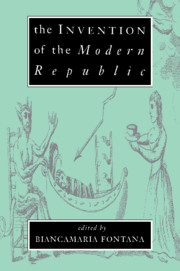Book contents
- Frontmatter
- Contents
- List of Contributors
- Acknowledgements
- Introduction: the invention of the modern republic
- 1 Ancient and modern republicanism: ‘mixed constitution’ and ‘ephors’
- 2 Checks, balances and boundaries: the separation of powers in the constitutional debate of 1787
- 3 From Utopia to republicanism: the case of Diderot
- 4 Cordeliers and Girondins: the prehistory of the republic?
- 5 The constitutional republicanism of Emmanuel Sieyès
- 6 The Thermidorian republic and its principles
- 7 Francesco Mario Pagano's ‘Republic of Virtue’: Naples 1799
- 8 Kant, the French revolution and the definition of the republic
- 9 French historians and the reconstruction of the republican tradition, 1800–1848
- 10 The republic of universal suffrage
- 11 The identity of the bourgeois liberal republic
- Bibliography
- Index
10 - The republic of universal suffrage
Published online by Cambridge University Press: 05 February 2010
- Frontmatter
- Contents
- List of Contributors
- Acknowledgements
- Introduction: the invention of the modern republic
- 1 Ancient and modern republicanism: ‘mixed constitution’ and ‘ephors’
- 2 Checks, balances and boundaries: the separation of powers in the constitutional debate of 1787
- 3 From Utopia to republicanism: the case of Diderot
- 4 Cordeliers and Girondins: the prehistory of the republic?
- 5 The constitutional republicanism of Emmanuel Sieyès
- 6 The Thermidorian republic and its principles
- 7 Francesco Mario Pagano's ‘Republic of Virtue’: Naples 1799
- 8 Kant, the French revolution and the definition of the republic
- 9 French historians and the reconstruction of the republican tradition, 1800–1848
- 10 The republic of universal suffrage
- 11 The identity of the bourgeois liberal republic
- Bibliography
- Index
Summary
The republican idea acquired new meaning in France after 1830. It no longer designated a particular type of political system by referring only to the memory of 1792, nor by evoking the governments of ancient cities. Rather, it acquired a far more complex significance. Identified with the theme of universal suffrage, reference to the republic neatly concentrated a whole ensemble of social and cultural aspirations into a single word. The republic of universal suffrage implied, above all, the search for a society without divisions. Indeed the central problem of the first years of the July monarchy was that of social division. The onset of industrialisation widened schisms in the social fabric at the same time that the disappointment of the hopes raised by the 1830 Revolution aggravated political tensions. Such was the context in which the figure of the proletarian emerged. ‘The proletarian remains excluded’, summarised Blanqui in 1832. ‘Oh noble bourgeois, cease repelling us from your bosom, for we are men, and not machines’, demanded one of the first workers';journals, the Artisan, in 1830, while Lamartine wished that the name of the proletariat, ‘this base, injurious, pagan word [should] disappear from the language as the proletarian himself must disappear little by little from society’. The demand for universal suffrage, which emerged at the beginning of the July monarchy, was linked to this demand for social inclusion. In 1789, the demand for political equality had derived simply from the primary principle of civil equality: the essential struggle had been waged in the realm of civil rights, around the destruction of privilege and the suppression of legal distinctions between individuals.
- Type
- Chapter
- Information
- The Invention of the Modern Republic , pp. 192 - 205Publisher: Cambridge University PressPrint publication year: 1994
- 3
- Cited by



